- Home
- Anna Humphrey
Ruby Goldberg’s Bright Idea
Ruby Goldberg’s Bright Idea Read online
For my dad, who always finds a way to build it—whatever it may be
—A. H.
To my miracle girl who loves to read, Zoe
—V. B. N.
“Tomorrow is just another day to create something I hope will be worthwhile.”
—Rube Goldberg
Acknowledgments
Big thank yous to Julia Maguire and the editorial team at Simon & Schuster Books for Young Readers for dreaming up Ruby and inviting me to write her story, and to Rebecca Friedman of Hill Nadell Literary Agency, who never stops believing.
I also owe more than I can say to Heather MacLeod, who took such good care of my kids while I wrote all summer, and to my dad, who helped me to “build” Ruby’s machine on paper. Lastly, a heartfelt thank you to Gwyn for teaching me about dogs (and for being my mom’s faithful sidekick for nearly thirteen years). You were a good boy.
Chapter 1
Some people don’t know how to mind their own business. Dominic Robinson is definitely one of them.
It started on Friday afternoon at shared reading time. Every kid in Ms. Slate’s fifth-grade class was supposed to be taking turns reading from Sadako and the Thousand Paper Cranes while everyone else was supposed to be listening and following along with their finger.
And listening was exactly what I was doing—minus the finger part. Because my fingers were busy building something, which is a far better use of fingers, if you ask me.
“Why do you think the author included the spider in chapter one?” Ms. Slate asked the class. “Any ideas?”
“Because it’s lucky?” Supeng ventured.
“That’s right,” Ms. Slate said. “In Japanese culture spiders are considered lucky.”
“Or maybe because it might rain?” Eleni suggested. “My yaya says it rains when you see a spider.”
I knew a lot about spiders from the Amazing Arachnids exhibit at the Museum of Science in Boston, where my grandpa takes me every month. I was pretty sure the rain thing was only if you stepped on the spider . . . and even then it was only a superstition—not a scientific fact. Normally I would have set the record straight, but I was a little preoccupied. In a minute we’d be turning the page to chapter two, and my invention wasn’t ready yet.
My best friend, Penny, waved from across the room to get my attention. What are you doing? she signed. Penny isn’t deaf, but her cousin is, so she goes to sign language class on Tuesdays after school to learn how to communicate with him. As an added bonus, it comes in handy when your teacher sits you and your best friend on opposite ends of the room so you’ll stop talking.
Making, I signed back, since I didn’t know the American Sign Language sign for “inventing.” I tilted my book up to show her the clothespin on a string I’d attached to it, then held up my mini battery-powered pocket fan.
C-A-R-E-F-U-L, she finger-spelled back. Then she started twirling a strand of her shiny black hair around one finger, which is always what she does when she’s worried. I nodded. Penny was right. Caution was a must. The day before, during silent reading, I’d shared a really cool fact with the class. It was about the Hangzhou Bay Bridge in China, which is twenty-two miles long and crosses an entire ocean! You’d think everyone would have thanked me for the interesting and educational information, right?
Ms. Slate didn’t . . . and because it wasn’t the first (or second or third) time I’d shared a fact when we were supposed to be reading silently, and because then everyone got distracted from their books and started talking, she kept the whole class in for part of recess.
Plus there was the time the week before when I’d accidentally broken the candy jar on her desk because I’d wanted to be first in line for the Friday treat, and then nobody got to have a Hershey’s Kiss.
“You know, Ruby . . . not everything has to be a contest of who’s first,” Ally had said, sighing as she’d packed away her notebooks that day. “Now you ruined the greatest part of the week for everyone.”
“Yeah . . . ,” Colin had agreed. “Just like you ruined the honey field trip last year because you were showing off.”
Okay—that hadn’t been exactly my fault. When we’d visited a real working beehive last fall, the bee tender had gone on and on about how bees pollinate flowers (which everyone already knew). She hadn’t even mentioned the really interesting part—how bees communicate by dancing. So I’d helped her out with a short demonstration. Not that anyone had appreciated it.
“You owe us honey and chocolate now,” Colin had added. Then he’d stormed off behind Ally.
I didn’t mean to ruin things, of course. But didn’t everyone want to be first in line? And didn’t people want to know interesting things? I knew I definitely did!
All the same, Penny was right to warn me about my invention. I couldn’t afford to get in trouble again, or even she might get mad at me—not that she did that very often. As best friends went, Penny was amazingly patient, which was a good thing, because sometimes dealing with me took a lot of patience.
“Colin, would you start us off on chapter two?” Ms. Slate asked. The rustling of paper filled the air as everyone turned the page and Colin began. This was it. Ready or not, it was time to test the Ruby Goldberg Page-o-Matic (patent pending).
I could picture the infomercial already: Why strain yourself turning hundreds of pages? Get the Page-o-Matic today! With one easy motion you can pull the string attached to the clothespin, which opens to release the page and tilts the ruler, which hits the button that turns on the fan that blows the page over for you!
Or at least in theory it did—unless the clothespin wasn’t attached quite right. In which case it might come sproinging off the book and hit someone in the head.
“Ouch!” Brianne glared at me from across the aisle and rubbed her ear. “Ruby!” she said under her breath.
“Sorry,” I whispered. Luckily, Colin was having trouble pronouncing a Japanese word from the book, and Ms. Slate was so busy helping him that she hadn’t noticed the attack of the flying clothespin.
I pulled on the string to reel the clothespin back to my desk. Then I reattached the clothespin, firmly, to the book.
“Pssst. Ruby!” Dominic Robinson—a.k.a. the nosiest kid I know—leaned across the aisle on my other side. His thick brown hair fell into his eyes, like it always does, and he blinked out from underneath it. I couldn’t quite put my finger on it, but there was something about him that always reminded me of a turtle. “Try propping this under the fan.” He held out a pencil case with cartoon dogs on it. “It’ll give you a better angle.”
Now, don’t get me wrong. Even though he’s a first-class snoop, I won’t deny that Dominic Robinson is good at many things . . . multiplying with decimal places, acing every science test, sharpening his pencils to perfect points . . . but whispering in class is not one of them. He was talking WAY too loudly. Plus, he was looking right at me. Even the most amateur whisperer knows that the way to avoid getting caught is to look straight ahead!
“At shared reading time we show respect to our classmates by listening,” Ms. Slate reminded the whole room, but she was looking right at us when she said it. Dominic was still holding out the pencil case to me. I grabbed it and shoved it under my desk before we could get in any more trouble.
As Colin kept reading, I went back to work, looping the string on the clothespin more tightly so that I could control the tension better.
“Ally, would you read next?” Ms. Slate asked.
As everyone turned the page, I pulled carefully on my string. The clothespin opened. The page was released. The ruler tipped, hitting the button on the fan, which whirred to life, only—ACK! Dominic had been right
. The angle of the fan was wrong. Instead of blowing page nine over, the fan rustled page eight uselessly. I didn’t have much time. Without thinking, I grabbed Dominic’s pencil case and propped it underneath. Only, I shoved just a little too hard, and all of a sudden—CRASH!
The entire Ruby Goldberg Page-o-Matic smashed to the floor, along with my book and Dominic’s pencil case, which spewed markers everywhere. The pocket fan leapt and vibrated in crazy circles like some kind of deranged beetle, then smacked loudly into the leg of Dominic’s desk and went dead.
“Ruby!” Ms. Slate said, walking down the aisle. “What, may I ask, are you doing now?”
“Turning the page,” I answered. It was the honest truth. I bent over and picked up the string, ruler, and clothespin, then started to collect the spilled markers.
Ms. Slate sighed. “Next time see if you can turn the page without disrupting the entire class.” A bunch of kids at the front laughed. “There’s a time and place for experimenting and making inventions,” she went on, eyeing the collection of stuff on my desk, “and it isn’t during shared reading time . . . or math . . . or language arts . . . or community circle. We’ve talked about this before.”
“I know,” I said, tilting my head to one side and making my best, most angelic apology face. It wasn’t even that hard to do, because I was sorry. I didn’t mean to be disruptive. It was just that ideas had a way of rushing into my brain and filling it up so full that there was barely room left to focus on anything else.
“Books away,” Ms. Slate said, letting the subject drop. “We’ll keep reading on Monday. Before the bell rings, we need to talk about the science fair, anyway.”
Now she had my full attention. Along with Nature Week—when we got to take walks and study trees and bugs—the science fair was my favorite thing of the year. Two years ago, I’d taken the bronze medal for making a pinhole camera . . . and last year I’d won silver for my digital clock that ran on lemon juice.
“Here.” Dominic picked my pocket fan up off the floor and set it on the edge of my desk. It immediately rolled off again. “Oh. Sorry,” he said.
But even though bronze and silver were good, they weren’t gold! Dominic had won first prize the past two years—in third grade with a project where he’d taken apart and studied the inside of a digital camera, and then last year with a full-size grandfather clock that had run on the energy from potatoes. Both clear rip-offs of my ideas! Not that the judges had seemed to notice or care.
Dominic bent down, picked the pocket fan up again, and handed it to me this time. “Thanks,” I said coldly. After all, if he’d been minding his own business and reading Sadako, he wouldn’t have noticed me building the Page-o-Matic, or passed me his stupid pencil case. Then I wouldn’t have dropped my stuff and gotten in trouble in the first place. And, more important, if it hadn’t been for his copycat photography project and potato clock, I would have won the gold medal—or at least the silver—two years running.
Sure, Dominic appeared harmless enough with his blinky eyes, “helpful” suggestions, and cartoon doggy pencil case, but only I knew the truth. Underneath those overgrown bangs lurked a cunning, spying, ruthless science-project-stealer who would stop at nothing to win.
Well, not this year, I thought as I took a science fair sign-up sheet off the top of the pile and passed the others back. This year Ruby Goldberg was going for gold, and nobody—especially not Dominic Robinson—was going to stop me.
Chapter 2
On Friday afternoons most kids switch the channel in their brains the second the bell rings. They turn off thoughts of school and homework to focus on skateboarding, swimming, video games, and other weekend stuff. Penny was no exception. As we walked to my grandpa’s house that afternoon, she talked nonstop about the dance practice she had coming up on Saturday, and how her mom was sewing individual sequins onto some kind of Chinese peacock outfit for her final recital.
But then there are other kids, like me, who—Friday or not Friday—can’t seem to stop thinking about school stuff—or, okay, in my case, science fair stuff.
“I have to practice my hand like this for the peacock dance,” Penny was saying, making a beak kind of shape with her fingers. “It’s way harder than it looks.”
“Mmm-hmmmm,” I answered thoughtfully. “Peacocks,” I whispered under my breath. Maybe for my science project I could visit the zoo and investigate why peacocks spread their feathers to attract a mate. . . .
It wasn’t that I didn’t care about Penny’s dance thing, but with the science fair right around the corner and Dominic out to get me, I didn’t exactly have time to waste. I felt a tickle on my leg and reached down to brush off an ant—which made my mind race off in another direction. Ants! I could keep an ant farm and study their tunneling habits. Only, what would my hypothesis be? “Ants like to dig?” Everybody knows that.
“Miss Leung says the Chinese peacock dance is the most important folk dance in the Dai culture, so we need to do it just right, out of respect.” Penny was still talking. “I’m kind of worried. Do you think I’ll do a good enough job? I mean, I’ve been practicing hard, but . . .”
I pressed the button on the crosswalk, and the lights started flashing. We waited for the traffic to stop, and then crossed carefully. Then again, I thought, peacocks were pretty, and ants were interesting, but animals weren’t exactly my area of expertise. Except for my grandpa’s dog, Tomato, I’d never even had a pet in my family. I was more into the mechanics of things—like how, exactly, when I pressed the crosswalk button, did the energy flow up to the sign and make it start to flash?
“Ruby?” Penny said. “Earth to Ruby . . .”
“Uh-huh,” I answered.
“Are you even listening to me?”
“Of course I am!” I said. I’d caught the basics. “Your peacock costume is going to look great. Your mom’s a great sewer. Don’t worry.”
Penny just kind of sighed, shook her head, and smiled. “You’re thinking about the science fair, aren’t you?” she said. “I can tell.”
“Maybe a little,” I admitted. I pulled a flower off a bush as we passed and studied its stamen. Maybe I could do something about plants? But Supeng had done an experiment with bean sprouts the year before where she’d played them classical music to see if they would grow faster, and the results hadn’t been very conclusive. “I need to come up with something really good,” I explained. “There’s no way I’m letting Dominic win gold—especially not after he stole my last two ideas.”
Penny tilted her head to one side, giving me her most patient look. It wasn’t the first time we’d had this conversation. “You know we still don’t have any proof of that,” she said.
“Proof!” I spat back. “I did a photography project. He did a photography project. I made a lemon clock. He made a potato clock. What more proof do you need?”
“I know. I know,” Penny said, trying to calm me down. “It’s just . . . maybe he didn’t mean to copy you. There are only so many ideas for science projects out there.”
“There are a million ideas for science projects!” I said, looking around wildly. A gnarled old tree caught my eye. “You could study the life cycle of tree fungus! Or figure out why leaves change color in the fall!”
“Why do they turn red and brown in the fall?” Penny asked, looking up. It was early October, but it had been so warm that we were wearing T-shirts, and most of the leaves were still on the trees. “That would make a great project.”
I looked at her like she was crazy. “It’s because they stop making chlorophyll when it gets cold,” I explained. “When the green fades, the other colors in the leaves start to show.” There was a whole chapter about it in the tree book I’d had since third grade. It was interesting, but not really fifth-grade-gold-medal-science-project material.
“Anyway . . . ,” I said, going back to the more important topic we were discussing. “Dominic just has no creativity—and he’s so snoopy. Did you see him staring at my invention and then ha
nding me that pencil case, practically right in front of Ms. Slate’s nose? Why couldn’t he just mind his own business . . . or make his own invention if he was that interested?”
As we approached my grandpa’s house, we could see that his neighbor, Mr. Petrecelli, was out on his porch trying to hunt down a fly with a rolled up newspaper.
“Hi, Mr. Petrecelli,” Penny called out, although I wasn’t sure why she bothered. The old man just kind of grunted in response, which was all he ever did. Well, that and yell if we stepped so much as one foot on his precious lawn.
“Ha!” he exclaimed, totally ignoring us and swinging his newspaper down hard against the railing. When he saw that he’d successfully squashed the fly, he looked almost happy, but only for a second. Then he tossed the newspaper onto a little table and went back to sitting in his chair, scowling at the street.
“I don’t know,” Penny continued as we started up the path to my grandpa’s house, carefully avoiding Mr. Petrecelli’s grass so he wouldn’t come after us with his newspaper. “Maybe Dominic was just trying to help when he gave you the pencil case.” I raised my eyebrows to say I seriously doubted that. “Anyway,” she went on. “It doesn’t matter. Just make the best project you can make, and don’t worry about Dominic, okay?”
“Oh, I will make the best project,” I answered, sounding more confident than I felt.
“I know you will,” she said, and smiled as we pushed open my grandpa’s front door. “You always make the coolest stuff. Like that thing you were doing today. I mean, until it thwacked Brianne in the head with a clothespin and then broke and got you in trouble. That looked amazing. What was it?”
“Oh, that?” I said, like it was nothing, even though it had been kind of inspired. “That was just a simple Rube Goldberg machine.”
“Did I hear someone say ‘Rube Goldberg’?” Grandpa came into the house through the back sliding doors and stopped at the sink to wash some gardening dirt off his hands. Tomato, his dog, waddled in behind him, walked in two slow circles, and then sank down in his bed beside the couch. “You know, I met Rueben Goldberg once,” Grandpa went on.

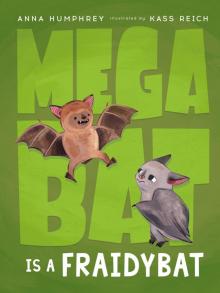 Megabat Is a Fraidybat
Megabat Is a Fraidybat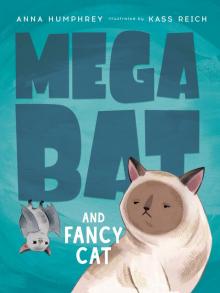 Megabat and Fancy Cat
Megabat and Fancy Cat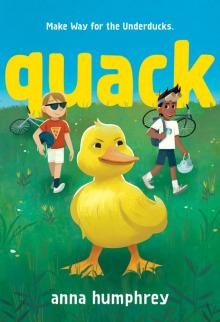 Quack
Quack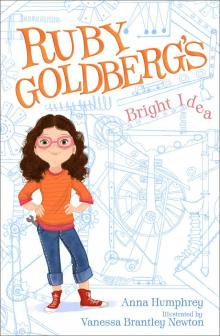 Ruby Goldberg’s Bright Idea
Ruby Goldberg’s Bright Idea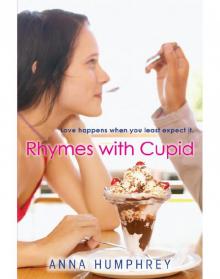 Rhymes with Cupid
Rhymes with Cupid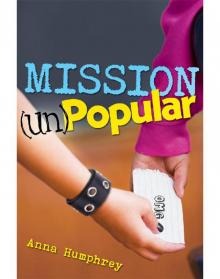 Mission (Un)Popular
Mission (Un)Popular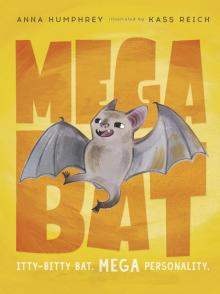 Megabat
Megabat